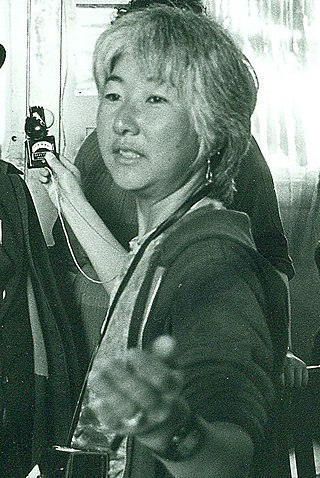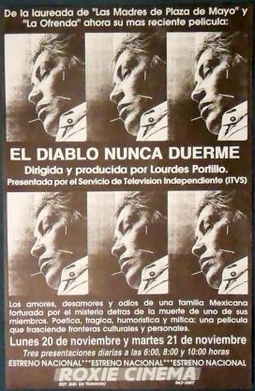
Selena Quintanilla-Pérez was an American singer. Referred to as the "Queen of Tejano Music", her contributions to music and fashion made her one of the most celebrated Mexican-American entertainers of the late 20th century. In 2020, Billboard magazine put her in third place on their list of "Greatest Latino Artists of All Time", based on both Latin albums and Latin songs chart. Media outlets called her the "Tejano Madonna" for her clothing choices. She also ranks among the most influential Latin artists of all time and is credited for catapulting the Tejano genre into the mainstream market.

Barbara Jean Hammer was an American feminist film director, producer, writer, and cinematographer. She is known for being one of the pioneers of the lesbian film genre, and her career spanned over 50 years. Hammer is known for having created experimental films dealing with women's issues such as gender roles, lesbian relationships, coping with aging, and family life. She resided in New York City and Kerhonkson, New York, and taught each summer at the European Graduate School.
Susana Blaustein Muñoz is an Argentine film director. She directed four films since she started her career in 1980. She also produced one of those films, the documentary The Mothers of Plaza de Mayo (1985), with co-director Lourdes Portillo, about the Mothers of the Plaza de Mayo who looked for their disappeared children during the Dirty War. This film was nominated for an Academy Award for Best Documentary Feature. Her last film was 1993's Mi casa, mi prisión.

Luis Miguel Valdez is an American playwright, screenwriter, film director and actor. Regarded as the father of Chicano film and playwriting, Valdez is best known for his play Zoot Suit, his movie La Bamba, and his creation of El Teatro Campesino. A pioneer in the Chicano Movement, Valdez broadened the scope of theatre and arts of the Chicano community.
Stephen Low is a Canadian film director and screenwriter who works extensively in the IMAX and IMAX 3D film formats. Based in Montreal, Quebec, over his 30-plus year career Low has directed numerous award-winning film documentaries including Challenger: An Industrial Romance (1980), Beavers (1988), Titanica (1991), Super Speedway (1997), Volcanoes of the Deep Sea (2003), Fighter Pilot: Operation Red Flag (2004), Ultimate Wave Tahiti 3D (2010), Legends of Flight 3D (2010), Rescue 3D (2011), Rocky Mountain Express (2011) and Aircraft Carrier (2017).

Nuevo Cine Mexicano, also referred to as New Mexican Cinema is a Mexican film movement started in the early 1990s. Filmmakers, critics, and scholars consider Nuevo Cine Mexicano a "rebirth" of Mexican cinema because of the production of higher-quality films. This rebirth led to high international praise as well as box-office success, unseen since the golden age of Mexican cinema of the 1930s to 1960s. The quality of Mexican films suffered in the decades following the golden age due in part to Mexican audiences watching more overseas films, especially Hollywood productions. This resulted in the rise of infamous Mexican genres such as Luchador films, sexicomedias and ultimately the low-budget direct-to-video Mexploitation film.
Rea Tajiri is a Japanese American video artist, filmmaker, and screenwriter, known for her personal essay film History and Memory: For Akiko and Takashige (1991).
Renee Tajima-Peña is an American filmmaker whose work focuses on immigrant communities, race, gender and social justice. Her directing and producing credits include the documentaries Who Killed Vincent Chin?, No Más Bebés, My America...or Honk if You Love Buddha, Calavera Highway, Skate Manzanar, Labor Women and the 5-part docuseries Asian Americans.

Debra Chasnoff was an American documentary filmmaker and activist whose films address progressive social justice issues. Her production company GroundSpark produces and distributes films, educational resources and campaigns on issues ranging from environmental concerns to affordable housing to preventing prejudice.

Tami Kashia Gold is a documentary filmmaker, visual artist and educator. She is also a professor at Hunter College of the City University of New York in the Department of Film and Media Studies.
Rosa-Linda Fregoso is the Professor and former Chair of Latin American and Latino Studies at the University of California, Santa Cruz.
Betzy Bromberg is an American director, editor, and experimental filmmaker. She is the Director of the Program in Film and Video at California Institute of the Arts. Her work has been shown at the Rotterdam, London, Edinburgh, Sundance and Vancouver Film Festivals as well as the Museum of Modern Art, Museum of Fine Arts, Boston, the San Francisco Cinematheque, the Harvard Film Archive (Cambridge), Anthology Film Archives, the National Film Theater (London), The Vootrum Centrum (Belgium) and the Centre Georges Pompidou (France).
Corpus: A Home Movie about Selena (1998) is a film by filmmaker Lourdes Portillo about Mexican American singer-songwriter Selena Quintanilla-Pérez. It places emphasis on the transformation of Selena from a popular entertainer into a modern-day saint and role model. This documentary uses authentic home videos, news stories, footage from concerts and a debate between intellectuals to analyze the effect of Selena and Selena's murder at the hands of Yolanda Saldivar, the president of her fan club.

Alexis Krasilovsky is an American filmmaker, writer and professor. Krasilovsky's first film, End of the Art World documented artists including Andy Warhol and Robert Rauschenberg. Krasilovsky moved from New York to Los Angeles in the 1970s to pursue her passion for filmmaking, writing and directing films through her company, Rafael Film. She is the writer and director of the global documentary features, Women Behind the Camera and Let Them Eat Cake.
Rossana Lacayo de Herguedas known professionally as Rossana Lacayo is a Nicaraguan photographer, scriptwriter, and filmmaker. She is considered a pioneer of Nicaraguan cinema as stated by the Nicaraguan Cultural Institute. In 2003 she founded Gota Films (Nicaragua) an independent film company. She is a member of ANCI. Lacayo resides in Nicaragua with her family.

Emiko Omori is an American cinematographer and film director known for her documentary films. Her feature-length documentary Rabbit in the Moon won the Best Documentary Cinematography Award at the 1999 Sundance Film Festival and an Emmy Award after it was broadcast on PBS that same year. One of the first camerawomen to work in news documentaries, Omori began her career at KQED in San Francisco in 1968.
Judith Dwan Hallet is an American documentary filmmaker.
Kimberlee Bassford is an independent documentary filmmaker from Honolulu, Hawai‘i. In 2005, she founded Making Waves Films LLC, which is a documentary production company. She advocates for gender equity and diversity in films and television. Most of her work focuses on Asian American women and young girls, and her films actively seek to correct underrepresentation of those groups in the media.

The Devil Never Sleeps is a 1994 Mexican-American documentary film directed by Lourdes Portillo and produced by Portillo and Michelle Valladares.









